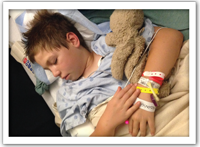
Riley
Living the Life of Riley
Our son Riley suffered his first seizure at age four and a half. At his lowest point in the first year of being diagnosed with Doose Syndrome, an intractable form of epilepsy, he was experiencing up to a hundred seizures a day. The first anti-seizure medicine we tried, Trileptal, triggered a rapid increase in seizures and was quickly replaced with Depakote which didn’t work alone, so Topamax was added. At the age of five, he was taking 22 pills a day—pills that barely slowed the frequency of his seizures but left him with a mountain of ugly side effects.
The side effects transformed our once-precocious, bright, active son. Depakote killed Riley’s appetite, made him drowsy and sluggish, clumsy and unsteady when he mustered the energy to walk. He bruised from anything more than a light touch. Topamax stole words from his mind, slurred his speech, and compounded the sluggishness. His mental processing speed slowed to the point that it took him thirty seconds to compose the sentence, “My sister likes strawberries, too.” He lost the ability to control his bladder and bowels. As kindergarten loomed, the child who had been reading at age four could no longer recognize the letters in his own name. Riley had become a drooling, glassy-eyed zombie. It was heartbreaking to live with.
Over six months, we tried a variety of dosing changes, but the FDA-approved pharmaceuticals damaged his quality of life more than the seizures alone did. With our neurologist, we made the decision to try the Ketogenic diet, a medical diet therapy that involved weighing every bit of food and drink to the tenth of a gram. The Ketogenic diet provided some relief from the seizures, bringing Riley’s seizure count from 650 a week down to 30 or fewer. We stayed on the diet for four and a half years, never going more than 10 days without a seizure but averaging a handful a week.
Ever in search of the perfect combination of medication and diet that would completely eliminate Riley’s seizures, we continued to try different pharmaceuticals in different doses and in different combinations: Keppra, Onfi, Banzel, Diastat, Klonopin, Vimpat, Clorazepate, Felbatol, and Lamictal. Increase this one, decrease that one. Add this, eliminate that. And every single one of those medications came with a laundry list of side effects from possible liver damage, risk of glaucoma, depression, and violent rage to threats of suicide.
Our lives had become a never-ending science experiment, except instead of a blue ribbon from the science fair judges, we were balancing side effects and risks while searching for the possibility that maybe, possibly, hopefully the next change would bring our son the elusive seizure freedom that we sought. Riley even underwent surgery this March to have a vagus nerve stimulator implanted. It has helped some, but three months later he still averages three or four seizures a week.

And still we search. We continue to pursue every possibility known to the medical community, but our options are dwindling. When word of pediatric epilepsy patients finding success with high CBD/low THC orally administered cannabis oil began to come out of Colorado, we wanted to add that treatment to Riley’s list of possibilities. We discussed it with our neurologist, who said that he would recommend it for Riley in a heartbeat, if it were legal in Texas. If only it were legal!
Currently, our son is excited about starting middle school in the fall. He will spend most of the day in the self-contained special education classroom because, despite being eleven years old, his IQ is 72. He is labeled Intellectually Deficient (ID), and functions academically as a second grader, socially and emotionally as a seven year old. His mental processing speed is in the 0.2 percentile. He has autistic tendencies. Some of Riley’s characteristics are the result of the thousands upon thousands of seizures and the damage they have wrought on his brain. Some of his characteristics are the result of damage caused by the thousands upon thousands of milligrams of psychotropic medications he has taken over the past seven years.
How wonderful it would be if high CDB/low THC cannabis oil were a legal option for epilepsy patients like Riley who live here in Texas! For the sake of our son and the thousands of other Texans like him who continue to suffer conditions that can be ameliorated by medical cannabis, we implore you to support the bill legalizing the medical use of high CDB/low THC cannabis oil with your voice and your vote.
